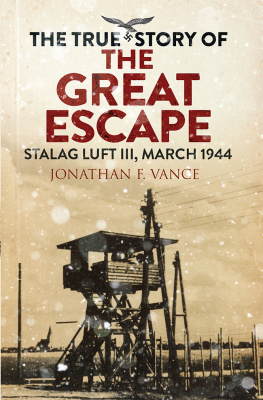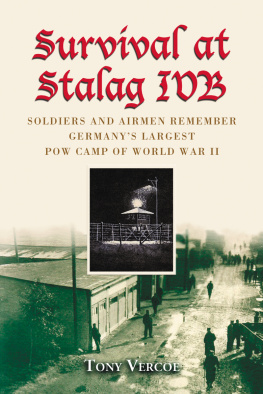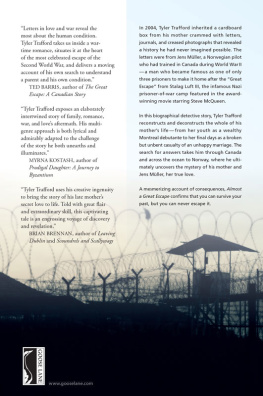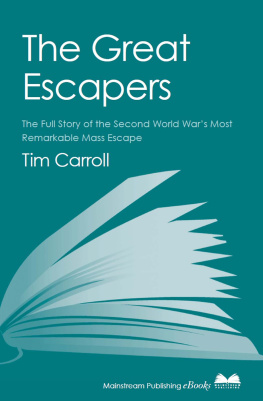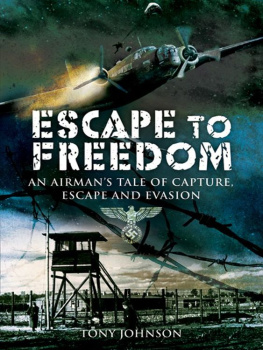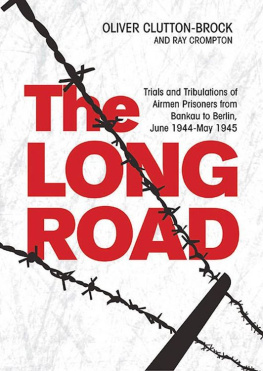
Everyday P.O.W.
By
Bradford P. Wilson
Edited with an Introduction by Perry Bradford-Wilson
Storyteller Press
Pollock Pines, CA
Everyday P.O.W.
2010 by Perry Bradford Wilson
All rights reserved under International and Pan-American Copyright Conventions. Without limiting the rights under copyright reserved above, no part of this book may be reproduced or transmitted in any form or by any means, electronic or mechanical, including photocopying, recording, or by any information storage and retrieval system, without permission in writing from the author.
Published in the United States by Storyteller Press, 5774 Sierra Springs Drive, Pollock Pines, CA 95726
http://www.storytellerpress.com/
ISBN 1-880053-03-9
First Printed Edition, September 2010
First Digital Edition, September 2010
Library of Congress Cataloging-in-Publication Data is available from the publisher.
Book design by Perry Bradford Wilson
Table of Contents
Introduction
Prologue - September 12, 1944
1 Son of Three Sisters
2 December 7, 1941
3 Primary Training, 1943
4 Navigation, 1943
5 Across The Sea, 1944
6 The 445th, 1944
7 Barbara, 1944
8 Prisoner of War, 1944
9 The Long Wait, 1944
10 The End of Stalag Luft 1, 1945
11 The Trip Home, 1945
12 An Anniversary
Afterword
Introduction
by Perry Bradford Wilson
Almost every Saturday morning throughout my childhood my family sat around the breakfast table after we finished the double-helping of pancakes, waffles or French toast (the syrup breakfasts, as we called them) that my dad had made for us, and we talked. If we didn't have any major weekend plans these after-breakfast conversations could last two or three hours. My brother, sister and I talked about our school week. My mother talked about her week. But my father didn't talk about work.
Not that his job wasn't interesting he worked first for NASA, and then later as a civilian administrator for the cumbersomely-named Army Air Mobility Research and Development Laboratory. Personally, I thought the huge hangers and wind tunnels at Ames Research Center were fascinating. But my dad worked in the number-crunching end and didn't have much to say about work. Instead he talked about the world at large.
He talked politics, science, pop culture; whatever came to mind. It was always fascinating, because he never pontificated. He just threw out ideas, many of them hilariously funny, and we learned from him.
On many occasions he talked about his childhood in the rural California communities of Almaden and Redwood Valley during the Great Depression. He didn't particularly like to talk about himself he had no issues of ego. These talks weren't overly wistful reminiscences, either. Usually they were framed in a historical context; the fallout of World War I, the changes in technology, the fallout of the Depression, the world stage and coming of World War II. Yet these events were described in a personal context that defined them in a relatable way.
As a student fascinated by history (and just about anything else) I loved these Saturday morning talks. However, as I got older I noticed something. The survey of history usually ended at the beginning of World War II and then picked up again after the war was over. When he did talk about the war it was in bold strokes that painted the same information we learned at school. Before and after the war his history was personal. During the war it was factual. In fact, my mother's stories of how her family dealt with rationing and other home front issues during the war were far more personal than anything my dad said.
My siblings and I already knew the general outline of his wartime experiences; my father was a navigator in the Army Air Corps during the war. He was shot down over Germany and spent the better part of a year in P.O.W. camp. But beyond these facts the details were always sketchy.
Finally one Saturday morning I asked him directly about it. Was he uncomfortable talking about it? No, he said, although he didn't explain why he hadn't bothered to bring it up. I was just an everyday P.O.W, he added. Then he proceeded to tell us his story in more detail than ever before.
Over time he finally seemed to exhaust the subject but I was always curious for more details. Since I missed Vietnam (by a handful of years) and was too old by the time Bosnia and the various Gulf conflicts arose, I never had to think about serving during a hot war. Safe and sound in California it was hard to imagine being put in harm's way at such a young age. How did all those average Joes cope with sudden immersion in armed conflict? In college I interviewed my Dad on camera about his war experiences for a broadcasting class project. I recorded several hours of audio interviews with him a few years later.
Finally, in the late 1990s, I suggested to my father that he should write some of this down himself, in his own words. A young Belgian man named Luc Dewez had likewise been pressing him to write some of his experiences down. Luc was gathering information about the 8th Air Force and the war from his country's perspective. At last my dad gave in and started writing.
Once in a while he e-mailed me a chapter or two and asked me what I thought. The manuscript was just what I hoped it would be; not a history lesson, but a recollection of how one rural California boy made it one day at a time through challenging circumstances. I promised him that if he didn't try getting it published then I certainly would.
After his death in December 2007 I sorted through the files on my father's computer (at the age of 86 he was very computer literate) and found the manuscript he had been working on. It was unfinished, but most of the story was there. In addition I had many other resources he had shared with me. As the unofficial family historian he had given me boxes of old photographs, including the actual journals he wrote while in prison camp and the telegrams his parents received from the War Department.
So I kept my promise. Here, with minimal editing in order to keep the text in his words as much as possible, is his story. There are some jumps from time to time bridging sections he meant, I am sure, to fill in later. I've tried to smooth over these transitions without altering the substance of the manuscript.
When I read these pages I still marvel at how my father took each new event in stride and wonder how I would match up in similar circumstances. I suppose we all rise to the occasion when pressed, but I think (and I am, of course, biased) that he was an exceptional individual.
NOTE
LETTERS HOME
From the time he joined the Army through the day he was shot down and became a prisoner of war, my father regularly wrote letters home to his parents. In the printed version of this book they are presented throughout the manuscript boxed as sidebar features. In this digital eBook edition the letters are presented at the beginning or end of each chapter in italics.
Brad Wilsons STALAG LUFT 1 P.O.W. JOURNAL, 1945
During the months of January, 1945 through May, 1945 my father kept a diary or journal while he was incarcerated in Stalag Luft 1 as a prisoner of war. It was hand written by pencil in a blue book sort of slim stapled paper booklet. Some of the entries in his journal concern what was currently taking place and others are memories of what had happened in the past. I have decided to include entries from the journal throughout this book with their subject matter. In the printed edition they were placed throughout the manuscript, however in this digital eBook edition they are generally presented at the beginning or end of each chapter in italics.
Next page

